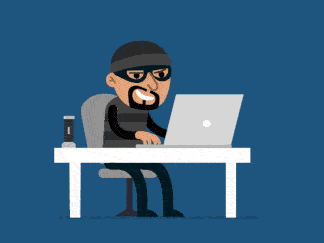Cybersecurity
Are You Safe On The Internet? | Top 10 Tips To Be Safe On The Internet
May 16, 2020 | By Parag
2624 Views

India is the second most country that is affected by cyberattacks, according to a (DSCI) report. The Internet is a massive part of every individual in day to day existence. Rising cyber-attacks has led to substantial financial losses to the companies. The COVID-19 pandemic, not only affected human but also led hackers to put a new twist on attacks that already exists. Also, they have started developing a variety of new malicious websites that looks legitimate to the users, thereby targeting individuals and large organizations with COVID-19-related scams and phishing emails by attaching malicious files containing malware payloads. Internet being informative, it can also be dangerous, no matter how safe you feel while browsing.
BELOW ARE THE SILLY REASONS WHERE THE DANGER LIES:
A) Visiting a site and unknowingly fall into a trap, such as:
- Clicking external popup’s.
- Clicking unknown links that leads to a dangerous path.
B) Sometimes just by visiting a link, the software gets downloaded which executes automatically in the background.
C) Installing a cracked/mod software.
D) Giving Personal Information on the Websites.

Nowadays, everyone is spending a lot of time on the internet. Be sure that the internet is a complicated place, and it’s possible to run into trouble online if you aren’t careful.
So I’ve got the top 10 security tips which will help you in getting into trouble online.
1) ALWAYS USE STRONG AND UNIQUE PASSWORDS
Here’s how to create a strong password.
- Choose a password that’s long enough, i.e., having a minimum of 12 to 14 characters in length.
- Use a mix of different types of Capital LettersNumbers, Symbols, and Lower-Case Letters to make the password harder to crack.
- Always Stay away from distinct dictionary words and combinations of dictionary words. Eg. “Welcome111”, “Hello123”, etc.
To be more secure, use Passphrase instead of Passwords. Eg. ThiSisPassW0rdPhras3^(17_!0)
2) USE 2 FACTOR AUTHENTICATION
With 2-Factor Verification, you add an extra layer of security to your account. How this works: when you log in to any of the services, you will be asked to enter your mobile phone number to verify your identity either by clicking on a texted/emailed link or by typing a security number sent by an authenticator app like Google Authenticator. Even if your password gets hacked, no one can access your account without your permission.
3) NEVER SHARE OTP OR ANY OF THE BANK DETAILS WITH ANYONE
Nowadays, online fraudsters and spammers have been coming up with different ways of social engineering to steal the OTPs, thereby withdrawing money. No matter who calls you, never and ever give your confidential one-time-password over Call/Whatsapp/Email. Always remember that banks never ask for OTP, which means that whenever the person asking you for your OTP is trying to hack your account, thereby stealing your money.
4) LOG OUT OF THE WEBSITES WHEN YOU’RE DONE USING THEM
Whenever you surf over the internet via browsers, the browser remembers your history as well as username/password if you have saved them. This allows browsers to log in automatically whenever you come back. I always recommend that whenever you close your browser, try to log out if you are already logged in or clean your browser’s history because if you remain logged in or forget to log out from the browser, the next person using the same browser will be able to access your accounts.
5) NEVER SHARE PERSONAL INFORMATION ONLINE
Protecting your personal information can help you to reduce your risk against hackers. If anyone asks, your data always ask why they want and how they are going to safeguard it. Don’t share your personal data over the phone call/mail unless you know who you’re dealing with.
6) DON’T OPEN EMAILS OR ANY FILES FROM THE PEOPLE YOU DON’T KNOW
Always be alert of suspicious emails containing the attachments, because the attackers are finding new ways to get around email security filters. If you unknowingly download one of the email attachments or click on a link within the document, you will get diverted to a malicious website that will steal your sensitive information. Before clicking on any link within an email or any of the email attachments, always remember to hover(move your mouse) over the links to see where it redirects/diverts you.
7) AVOID CLICKING ON WEBSITES THAT LOOK FAKE OR SPAMMY
Nowadays, Hackers are continually evolving their methods to steal data. One of the oldest techniques in the cyberworld is to make a fake or scammed/phishing website. The Fake/Phishing websites are designed in such a way that you will be to tricked and will get trapped. So always remember to hover(move your mouse) over the links to see where it would redirect/divert you.
8) ALWAYS USE ANTIVIRUS AND ENABLE FIREWALLS TO PROTECT YOUR HOME NETWORK
Installing antivirus software and keeping it up-to-date helps in protecting your computer. Nowadays, many types of antivirus companies are detecting the presence of malware by searching for patterns in your computer’s files or memory. All Antivirus software uses signatures provided by software vendors to identify malware/viruses.
9) ALWAYS KEEP YOUR COMPUTER’S SOFTWARE AND OS UP TO DATE
Nowadays, security flaws are discovered regularly, and most of the companies are fixing these flaws. So it becomes necessary to update your software/OS to remain safe against these security flaws.
10) NEVER USE PUBLIC WIFI
Public wifi’s are very risky because there are chances that someone probably sniffs through all the internet traffic, thereby capturing data like credit card numbers/messages. Hackers probably use the older techniques to redirect/divert your internet traffic to the phishing websites to steal your data.
If you enjoyed the blog, please share as much as you can to help others find it. Feel free to Contact Me.